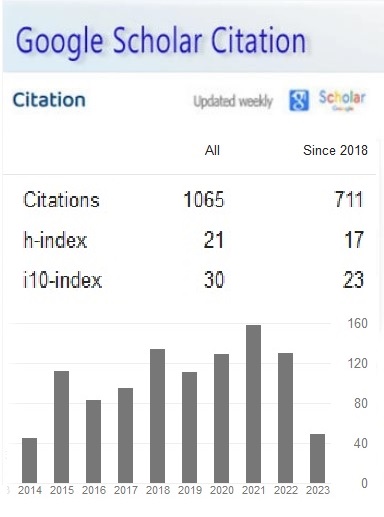Exploring Immersive Mixed Reality Simulations and Its Impact on Climate Change Awareness
Keywords:
Abstract
Purpose: To combat widespread climate change misconceptions that halt mitigation efforts, we investigate Mixed Reality’s applicability in helping contextualize climate change consequences.
Design/methodology/approach: We propose an immersive Mixed Reality system that simulates personally-relevant experiences relating to climate change disasters. To evaluate our methods, we conducted a pilot study with the constructed Mixed Reality system and analyzed collected statistics.
Findings: Participants reported heightened motivation to adopt more sustainable practices as a result of Mixed Reality system use; collected statistics display increased levels of stress and ratings of immersion from system use. Results display prominent applicability of Mixed Reality systems in climate change contextualization.
Research limitations/implications: Due to the lack of accessible Head-Mounted Displays, the pilot study is confined to a Mixed Reality format. Future work can examine effects of more realistic and localized approaches on stress and inclination levels; these effects may include real-time scanning and geographical mapping, dynamic object placement, information prompting, and improved spatialized audio.
Originality/value: We evaluate the relative effectiveness of current communication mediums and propose a novel MR system as a solution to global mitigation challenges. We evaluate the effectiveness of conveying climate change awareness topics through Mixed Reality with a pilot study.
Downloads
References
Clayton, S., Devine-Wright, P., Stern, P. C., Whitmarsh, L., Carrico, A., Steg, L., Swim, J., & Bonnes, M. (2015). Psychological research and global climate change, in Nature Climate Change (Vol. 5, Issue 7, pp. 640–646). Springer Science and Business Media LLC. https://doi.org/10.1038/nclimate2622
Collomb, J.-D. (2014). The Ideology of Climate Change Denial in the United States, in European journal of American studies (Vol. 9, Issue 1). OpenEdition. https://doi.org/10.4000/ejas.10305
Fleming, W., Hayes, A. L., Crosman, K. M., & Bostrom, A. (2020). Indiscriminate, Irrelevant, and Sometimes Wrong: Causal Misconceptions about Climate Change, in Risk Analysis (Vol. 41, Issue 1, pp. 157–178). Wiley. https://doi.org/10.1111/risa.13587
Khatibi, F. S., Dedekorkut-Howes, A., Howes, M., & Torabi, E. (2021). Can public awareness, knowledge and engagement improve climate change adaptation policies?, in Discover Sustainability (Vol. 2, Issue 1). Springer Science and Business Media LLC. https://doi.org/10.1007/s43621-021-00024-z
Kim, Y., & Kumaran, R. (2021). UCSB_3D Campus (Version 1.0.1) [Computer software]. available at: https://github.com/yujnkm/UCSB_3D (accessed 19 May 2022).
https://doi.org/10.5281/zenodo.6565136
Kim, Y., (2022). Investigating Search Among Physical and Virtual Objects Under Different Lighting Conditions. Working paper, University of California, Santa Barbara.
Mado, M., Herrera, F., Nowak, K., & Bailenson, J. (2021). Effect of Virtual Reality Perspective-Taking on Related and Unrelated Contexts, in Cyberpsychology, Behavior, and Social Networking (Vol. 24, Issue 12, pp. 839–845). Mary Ann Liebert Inc. https://doi.org/10.1089/cyber.2020.0802
Mandapuram, M. (2016). Applications of Blockchain and Distributed Ledger Technology (DLT) in Commercial Settings. Asian Accounting and Auditing Advancement, 7(1), 50–57. Retrieved from https://4ajournal.com/article/view/76
Mandapuram, M. (2017a). Application of Artificial Intelligence in Contemporary Business: An Analysis for Content Management System Optimization. Asian Business Review, 7(3), 117–122. https://doi.org/10.18034/abr.v7i3.650
Mandapuram, M. (2017b). Security Risk Analysis of the Internet of Things: An Early Cautionary Scan. ABC Research Alert, 5(3), 49–55. https://doi.org/10.18034/ra.v5i3.650
Mandapuram, M., & Hosen, M. F. (2018). The Object-Oriented Database Management System versus the Relational Database Management System: A Comparison. Global Disclosure of Economics and Business, 7(2), 89–96. https://doi.org/10.18034/gdeb.v7i2.657
Pandve, H., Fernandez, K., Khismatrao, D., Chawla, P., Singru, S., & Pawar, S. (2011). Assessment of awareness regarding climate change in an urban community, in Indian Journal of Occupational and Environmental Medicine (Vol. 15, Issue 3, p. 109). Medknow. https://doi.org/10.4103/0019-5278.93200
Pimentel, D., Amaya, R., Halan, S., Kalyanaraman, S., & Bailenson, J. (2019). Climate Change on Your Plate: A VR Seafood Buffet Experience, in 2019 IEEE Conference on Virtual Reality and 3D User Interfaces (VR). 2019 IEEE Conference on Virtual Reality and 3D User Interfaces (VR). IEEE. https://doi.org/10.1109/vr.2019.8798076
Tabari, H. (2020). Climate change impact on flood and extreme precipitation increases with water availability, in Scientific Reports (Vol. 10, Issue 1). Springer Science and Business Media LLC. https://doi.org/10.1038/s41598-020-70816-2
Williams, A. P., Abatzoglou, J. T., Gershunov, A., Guzman‐Morales, J., Bishop, D. A., Balch, J. K., & Lettenmaier, D. P. (2019). Observed Impacts of Anthropogenic Climate Change on Wildfire in California, in Earth’s Future (Vol. 7, Issue 8, pp. 892–910). American Geophysical Union (AGU). https://doi.org/10.1029/2019ef001210
Yang, H. S. (2009). Realistic e-learning system based on mixed reality, in Proceedings of the 8th International Conference on Virtual Reality Continuum and its Applications in Industry. https://doi.org/10.1145/1670252.1670255
Downloads
Published
How to Cite
Issue
Section
License
Copyright (c) 2022 Asian Journal of Applied Science and Engineering

This work is licensed under a Creative Commons Attribution-NonCommercial 4.0 International License.








